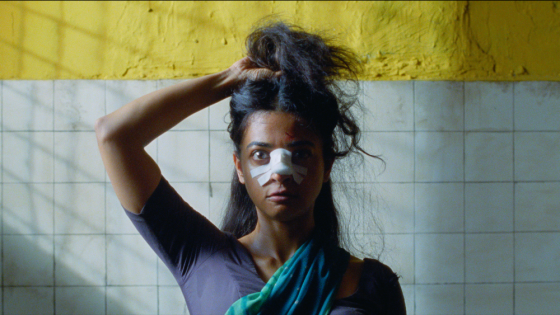Karan Kandhari‘s “Sister Midnight” is a surreal Mumbai fable with an aggressive comedic rhythm. It’s composed by hitting the same few notes ad nauseam, but hitting them exceptionally well and for much longer than one might expect before it eventually runs out of steam. All the while, Kandhari takes a novel visual approach to the topic of arranged marriage, situating his woebegone couple — his protagonist in particular, a woman who feels trapped — in a realm of strange psychosis. It’s better than it has any right to be, but not nearly as good as it should be.
Uma (Radhika Apte) is brash, acerbic and vulgar. Unable to cook or manage household expenses, she fulfills very few of the rigid expectations of a new Indian bride. When she arrives at her cramped new one-room apartment with her soft-spoken husband Gopal (Ashok Pathak) — an ostensible stranger — on their wedding night, the awkwardness between them is palpable. She wants to (or perhaps, believes it’s her duty to) sleep with him, but he can barely take his shirt off in front of her.
It doesn’t take long for Kandhari to establish his snappy comedic vibe, with all the calculated framing, editing and choreography of a Wes Anderson action scene (the wake in “The Grand Budapest Hotel” comes to mind, with its litany of well-timed punches). However, first-time feature director Kandhari also marches to the beat of his own drum, constrained by neither tone nor genre expectation. His music choices range from Bengali folk to American punk and blues. While of Indian origin, Kandhari is London-based and draws from a variety of cultural influences, but his depiction of working class Mumbai never feels inauthentic, especially in the movie’s quieter, low-lit moments, whose shadowy visual contrast creates striking portraits of Uma that verge on expressionistic.
While Gopal is at work, Uma tries to settle into a domestic routine, which involves everything from learning to chop vegetables to figuring out how to spend her free time in her crowded neighborhood, whose bustling noise prevents her from sleeping in. The happily married woman next door, Sheetal (played by Chhaya Kadam, who also stars in Cannes Grand Prix winner “All We Imagine As Light”) takes Uma under her wing and delivers even her most impassioned and welcoming lines with wry, impenetrable wit. It’s a role Kadam nails completely, finding variance even within comedic monotony, and she makes for an amusing contrast with Apte’s more fiery and unpredictable performance.
Between Uma’s gossiping neighbors and the pressures of social expectation, her psyche begins to rip apart at the seams, until eventually she finds a particularly macabre outlet for her frustrations. When her anxieties begin to manifest in the world around her, Kandhari makes tremendously inventive use of stop-motion elements. They cause a kind of fissure in his world-building, revealing seamlessly blended images that don’t quite make logical sense or — like Uma herself — feel like they belong.
However, the more sudden genre swerves “Sister Midnight” takes, the more Kandhari cedes control to an imagined version of his film that does not (and perhaps cannot) exist. His story holds Indian patriarchal norms to account and via its sensitive, anxious depiction of Gopal, makes him as much a victim of circumstance as Uma, if not more so. The exact subgenres from which “Sister Midnight” ultimately takes its cues are better left unspoiled, but several of its genre hallmarks harken back to films about the all-consuming nature of romance. However, the misfortunes that eventually befall Gopal, courtesy of Uma’s crumbling state of mind, lead to incongruous outcomes that feel too irreverently nasty.
Kandhari has a clear and perverse vision, but he’s also incredibly successful (perhaps to a fault) at eliciting sympathy for his characters. The bleak, punk-feminist parable he tries to build, using phantasmagorical imagery, strays too far toward the realm of disturbing — both emotionally and viscerally — to fully connect and keep viewers on its wavelength.
This dissonance also collides with (and perhaps contributes to) the movie’s clockwork rhythm becoming too mechanical to manage. Beyond a point, its visual comedy no longer remains unpredictable, and everything that initially works about its unique sensibilities becomes a burden, preventing “Sister Midnight” from undergoing the metamorphosis necessary to chase its initial surrealist high. The story soon gets away from Kandhari, leading to a film that enraptures and delights in its first hour but gets so locked in to a singular approach by its second that it’s practically consumed by its own style, rendering it unable to keep pace with the bold ideas at play.
Source Agencies


